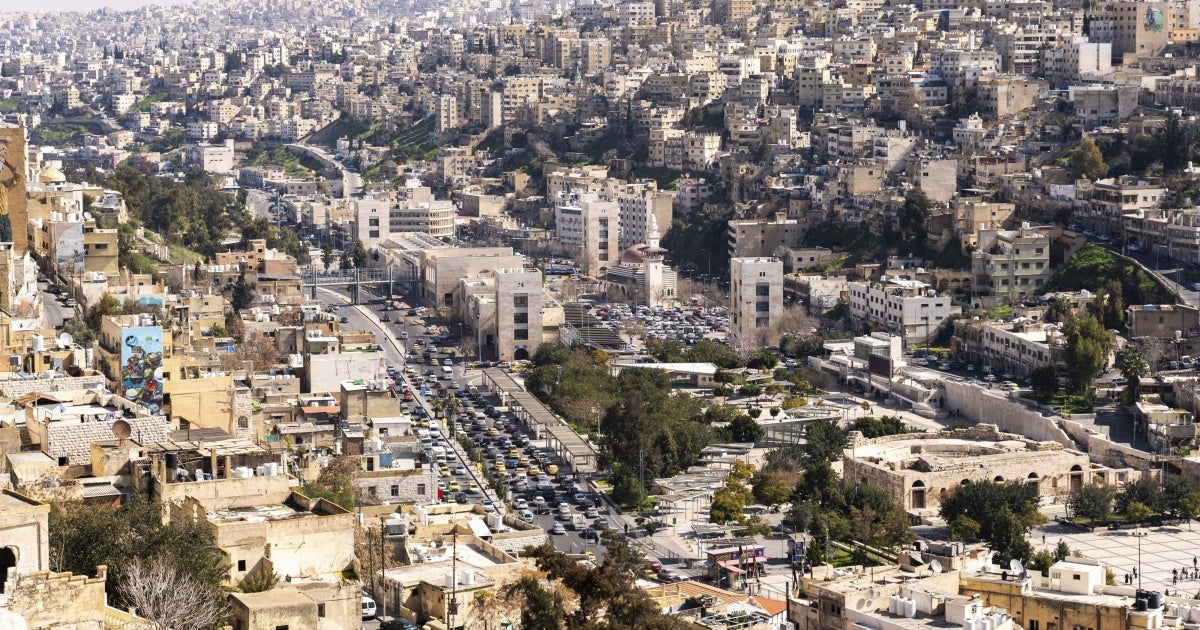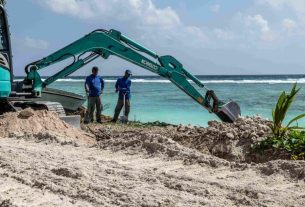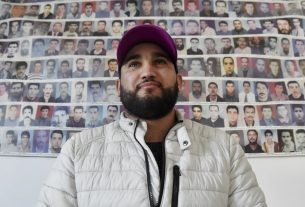(Amman) – Jordanian authorities have forcibly evicted and demolished homes and shops in an informal Palestinian refugee camp in Amman without adequate consultation, notice, compensation process, relocation assistance, or means of redress as part of a road expansion project, Human Rights Watch said today. More families are expected to be affected as the project continues.
The urban development project displaced scores of residents of al-Mahatta (Station) camp, and the government’s failure to follow international legal standards—such as proper notice, consultation, and compensation—violates their rights to housing, an adequate standard of living, and for families with children of school age, the right to education. The government should ensure that residents and shop owners receive fair and prompt compensation and ensure that future projects do not violate human rights.
“Displacing families and cutting off livelihoods without proper safeguards and a fair compensation process leaves scores of people with few places to turn for help,” said Adam Coogle, deputy Middle East director at Human Rights Watch. “Jordanian authorities should prioritize the rights of residents when considering infrastructure projects and ensure that no one is left without adequate housing or other fundamental rights.”
The demolitions in al-Mahatta camp are part of the Greater Amman Municipality’s 2022–2026 strategic plan. According to the chairman of the Old Amman Neighborhood Development Committee, the plan aims to redevelop informal and densely populated neighborhoods, including Jabal al-Taj, al-Joufeh camp, and downtown, by widening roads, reclaiming public land, decreasing population density, increasing green spaces, and easing traffic congestion.
The camp’s Defense Committee, which residents formed to negotiate on their behalf, said that as of February 2025, the municipality had ordered the demolition of 25 homes that housed at least 101 people, as well as several shops. Some shops were demolished on November 20, 2024, and the rest of the demolitions were carried out between November 27 and December 2.
Mayor Yousef Shawarbeh of Amman confirmed in a public statement on March 12 that the demolition work would continue in the area as part of ongoing development efforts. “In the next phase, we will continue removing all encroachments on Army Street and Rfiefan al-Majali Street, in accordance with the laws and regulations in effect,” he said.
Human Rights Watch interviewed eight camp residents, including home and shop owners and tenants, between November 2024 and February 2025. Human Rights Watch also wrote to the Greater Amman Municipality in November outlining concerns and asking questions, but did not receive a response.
Displaced residents told Human Rights Watch that the government gave them only two weeks to a month’s notice in November and vague, verbal promises of compensation of 80 Jordanian dinars (about US$113) per square meter, with little transparency about the process or timeline. The compensation promises did not meet basic international standards for compensation, which requires redress proportional to the harm suffered, including lost income, property value, and relocation costs. Compensation should not leave displaced residents worse off or force them into further hardship. Residents said that the amount verbally offered does not account for residents’ investments in renovating their homes and businesses.
In response to complaints about the inadequacy of the compensation, Mayor Shawarbeh said that residents were not entitled to compensation at all, as they were “encroaching on state land.” He clarified that what the municipality offered was not compensation but a “donation,” framed as a legal and humanitarian workaround rather than a right for the affected individuals.
The authorities ignored attempts by residents to halt the demolitions through peaceful public protests and dialogue, residents said. Later in December, authorities offered to increase “donations” for some residents.
Al-Mahatta, established after the 1948 mass displacement and dispossession of Palestinians during Israel’s creation, is not recognized by the Jordanian government as an official refugee camp. Residents receive water, electricity, and sanitation services and pay property taxes, yet the lack of recognition has left them without legal protections.
The evictions and demolitions have affected residents’ access to employment. One resident, who was the only regular breadwinner in his family, told Human Rights Watch in January that he had not been able to find work since the evictions. “From my old home I used to take a bus from al-Mahatta and reach the al-Nuzha or al-Hashmi neighborhoods in five minutes,” he said. He is now living in Tabarbour, around five kilometers (three miles) away from his demolished home. “Now I need to take a taxi or the Rapid Bus Transit for 2.5 dinars [about $3.50] which is a big increase [in expenses].”
A shop tenant said that “one of the municipality employees came before I moved and asked me why I haven’t vacated yet and said if I don’t vacate, they will demolish it over my head.” The move across the street to another building cost him about 5,000 dinars (about $7,052), which he borrowed from various people, not including items damaged during the move. He was not initially formally informed of a clear compensation mechanism and later received only 1,800 dinars (about $2,538) as compensation followed with verbal promises of more money, he said.
Affected families said that the evictions have disrupted their children’s schooling and made school transportation more costly and time-consuming. “It used to take [my son] 10 minutes to get to school from our old house and now it takes him around 30 minutes,” said one mother of three school-aged children. There is no free school bus, and the cost of those trips has also increased.
Another resident who was forced to relocate when his home in the camp was demolished said: “I used to give [my son] one dinar [about $1.40] for transportation when it took him 15 minutes to get there. Now I have to give him two dinars [about $2.80] and he rides two taxis to get to school.”
The family of a 9-year-old girl with paraplegia reported difficulty finding appropriate and accessible housing. Her family had to move to an inaccessible apartment with higher rent. Since the building has no elevators, her mother said that she carries her daughter up and down seven stairs to and from the school bus. The mother also said that they can no longer afford the private school that her daughter had been attending, which has better services. “The extra 75 dinars [about $106] we are paying for rent has changed our lives so much,” she said. “I still don’t know how to find a way to afford her education.”
In comments to Al Jazeera Arabic on November 14, a municipality official justified the demolitions in al-Mahatta camp as part of a long-term urban development plan to address encroachments on municipally-owned land. The official said that the targeted properties, including 24 homes and 19 shops, were built illegally and lacked proper licensing. He claimed that residents were notified over three months prior and a field survey was conducted to assess the situation.
But one resident said that the authorities did not formally notify them in June and only told them verbally that plans for the demolitions were under review. The official asserted that affected residents and shop owners will receive compensation exceeding the construction costs and insisted that the demolitions are lawful and necessary for the public benefit.
Under international human rights law, the authorities should explore all feasible alternatives before carrying out evictions, particularly those affecting large groups, and should consult with affected residents. Jordanian authorities did not carry out genuine consultation with affected residents, nor did they provide adequate and reasonable notice and information on the proposed evictions, compensation, relocation assistance, legal remedies, or alternative housing options, Human Rights Watch said.
“Jordanian authorities should ensure that residents who were denied adequate housing, especially those who are disadvantaged, have access to speedy and effective remedies,” Coogle said.
Al-Mahatta Camp and the Jordanian Government’s Obligations
Palestinian refugees sought refuge in the area now known as al-Mahatta camp, adjacent to Jabal al-Hashmi al-Shamali in Amman, following the 1948 Nakba (“catastrophe” in Arabic) during which over 700,000 Palestinians were expelled from or forced to flee their homes and more than 400 of their villages were destroyed in the events surrounding the establishment of Israel.
Over time, the area grew with residents gradually building, expanding, and renovating homes and shops. The camp houses approximately 8,000 residents according to the Encyclopedia of Palestinian Camps, a website that documents the history of Palestinian displacement and refugee camps in the region. Residents told Human Rights Watch that the camp also houses some residents who are not of Palestinian origin.
This is not the first time residents of the camp have faced expulsion. Up until 2019, the land was privately owned, and in 2017, private landowners filed a lawsuit seeking to remove the residents. The Jordan News Agency said that residents received eviction notices in 2017. In 2019, state media outletsreported that the government resolved the dispute by granting the landowners an alternative plot and transferring the ownership of the land to the municipality, allowing residents to legally remain in their homes.
Then-Prime Minister Omar al-Razzaz assured residents via a government decision that they would no longer face eviction. Despite these guarantees, the authorities issued the new eviction notices in November 2024.
Under international law, evictions should not leave people homeless or vulnerable to other human rights violations. The authorities should ensure access to adequate alternative housing, located near the original residence and livelihood sources and meeting international standards for security, infrastructure, affordability, and habitability. People with disabilities have a fundamental right to housing that is safe, secure, accessible, and affordable.
The government is responsible for ensuring that evictions do not cause a retrogression in residents’ economic, social, and cultural rights. The authorities should also prevent the separation of families and communities due to forced evictions. Additionally, authorities should ensure that evicted residents have access to essential needs, including food, potable water, sanitation, basic shelter, medical services, education, and livelihoods.



